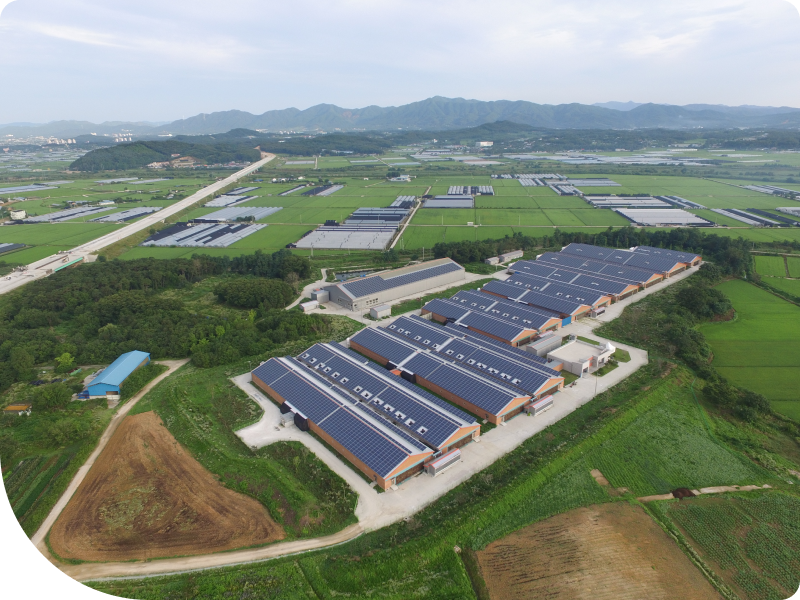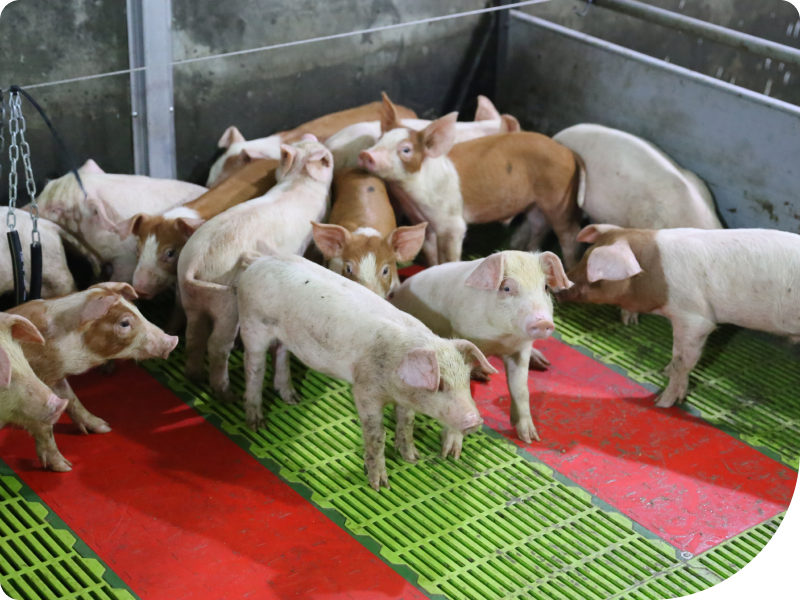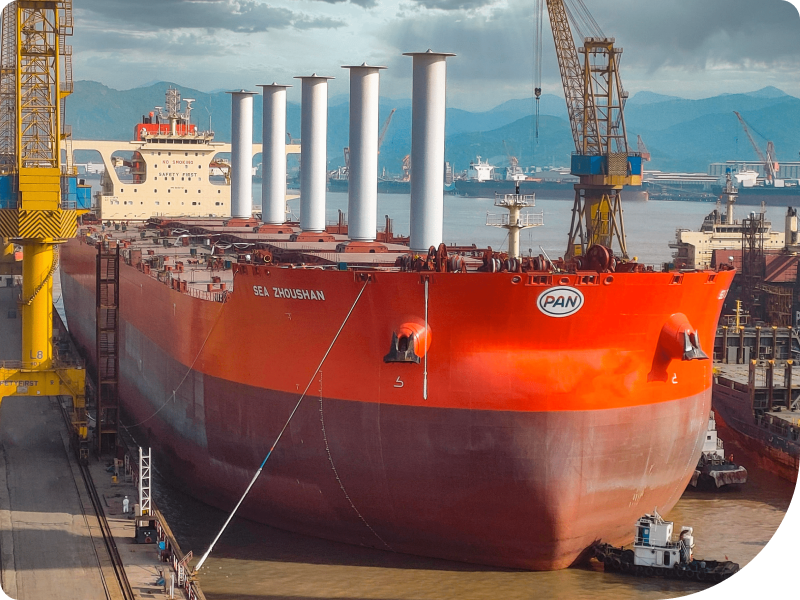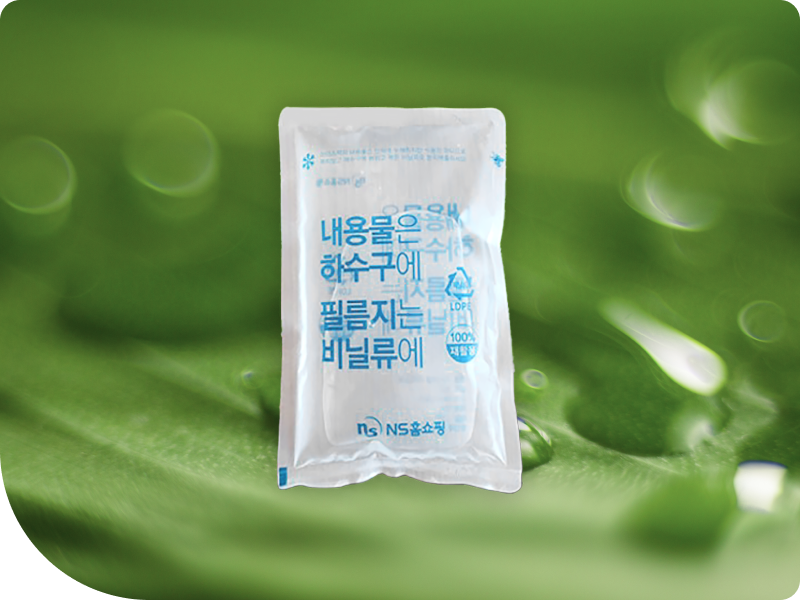At Harim, we are committed to building a healthy society where resources, animals,
people, and food are in balance, guided by our resource-circulating business structure.
We continuously work to create and preserve a healthy environment.
By utilizing resources efficiently and promoting recycling within our resource-circulating business model,
we minimize environmental impact. We are also dedicated to achieving carbon neutrality
by producing renewable energy and reducing carbon emissions, all with the goal of a sustainable future.
Environmental Preservation through Resource Circulation
Harim Group is shaping a sustainable future by enhancing resource efficiency through a resource-circulating business model. We have established an organic resource circulation system across various business areas, including grain, feed, livestock, slaughter and processing, food manufacturing, and distribution.
Farmsco, a leading pork specialist, practices eco-friendly resource circulation by producing organic fertilizers through the rapid fermentation of pig manure, replacing chemical fertilizers. Other companies within our group, such as Sunjin, Harim, Orpum, and Hangang Foods, actively collaborate with farms to convert manure into organic fertilizers.
Harim Co., Ltd., a chicken specialist, minimizes environmental impact by converting all by-products from the chicken production process into raw materials for feed and fertilizer, further supporting resource circulation.


By-products of Livestock
Heads, Feathers, Intestines, Bones
BIO Regeneration Process
Recycling
Resources
Feed Ingredients, Thermal Energy, Chicken Oil
Natural Environment
Grains
Turning by-products into resources, back to nature.

Eco-Friendly Farms
We are setting a new benchmark in eco-friendly livestock farming, eliminating environmental pollution with innovations such as the country’s first odorless pig farms. Unlike conventional livestock operations, companies like Sunjin, a leader in pork production, operate odorless, pollution-free farms that protect groundwater and soil from contamination. Air released through a triple filtration system in air purification rooms is odor-free, significantly reducing emissions and preventing air pollution. Additionally, water treatment and manure recycling systems prevent water pollution and convert waste into valuable resources. Companies such as Seti and Farm & Co, specializing in livestock environmental solutions, work closely with farms to address key environmental challenges, including manure purification and odor reduction.
Eco-Friendly Animal Welfare
We are elevating the value of life through animal welfare, fostering a sustainable livestock ecosystem. Harim Co., Ltd. introduced Korea’s first animal welfare production system in 2012, at a time when the concept was still new. As of 2024, we operate 252 antibiotic-free farms, with 84 of them also certified for animal welfare. In the pork sector, Sunjin is leading the way, operating 12 of Korea’s 25 animal welfare-certified pig farms. Farmsco has also pioneered the animal welfare pork market by introducing welfare systems to our four certified farms and slaughterhouses.


Greenhouse Gas Reduction
We are actively committed to reducing greenhouse gas emissions to combat climate change. As a regulated entity under the Greenhouse Gas and Energy Target Management System and the Emissions Trading Scheme, Harim Co., Ltd. continually installs renewable energy facilities at manufacturing sites, expanding efforts to lower emissions. Farmsco has equipped pig barn roofs with solar power generators, producing 3 kW of electricity per hour, while Sunjin operates a solar power plant that generates over 2.8 million kWh of electricity annually. Pan Ocean monitors real-time fuel consumption and greenhouse gas emissions, including CO2, CH4, and N2O, by ship type and year.
Eco-Friendly Maritime Transport
Pan Ocean, as a global bulk carrier, practices sustainable environmental management through eco-friendly maritime transport system. We installed sulfur oxide reduction devices on ships and launched a project to equip vessels with ballast water treatment systems, contributing to biodiversity preservation. By installing Alternative Maritime Power (AMP) systems, we reduce unnecessary air pollutants during docking by using power supplied from land rather than fuel. To lead the industry’s decarbonization efforts, we were the first company in Korea to introduce rotor sails, a propulsion system that harnesses wind power to reduce fossil fuel consumption. Additionally, we have introduced two LNG bunkering ships to expand eco-friendly fuel transportation and further lower greenhouse gas emissions. We are also advancing the development of autonomous ship technology and conducting joint research on autonomous navigation systems for future eco-friendly vessels.


Reducing Environmental Impact
We are committed to minimizing the environmental impact of our products and services. Since 2021, NS Home Shopping, a food-specialized broadcasting company, has adopted eco-friendly, recyclable, and biodegradable paper ice packs for all refrigerated and frozen product deliveries. In 2020, NS Home Shopping also participated in a pilot project with Suwon City to replace single-use packaging with reusable alternatives for deliveries. Harim Co., Ltd., Sunjin, Farmsco, and other food-related subsidiaries are also expanding the use of eco-friendly materials in ice packs and recyclable packaging. Additionally, the installation of high-efficiency LED lighting systems helps reduce CO2 emissions by lowering annual energy consumption.
